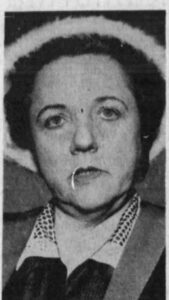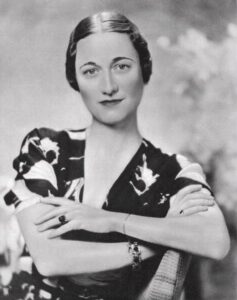The recent death of Queen Elizabeth brought many things to mind, including “That Woman”—the epithet chosen by Elizabeth’s mother for Bessie Wallis (Warfield) (Spencer) Simpson, whose marriage to King Edward VIII was the catalyst for Elizabeth’s eventual reign. Remembering the story of Wallis Simpson led me to investigate my own family’s version of “That Woman”: Lucille Forden, whose multiple divorces made her infamous and even thwarted her run for a seat in Congress.
“Those Women” shared some things in common. Wallis Warfield and Lucille Forden each had three husbands. Although neither was born in Baltimore, it was the city that both called home for most of their formative years and early adulthood.
Neither of them had happy first marriages. Although Wallis and Earl “Win” Spencer were married for slightly more than a decade, they spent much of that time separated, before divorcing in 1927. Lucille Forden’s marriage to Basil Gordon Smith lasted an even shorter time—she married her second husband only five years after her first wedding. In the meantime, she gave birth to her only child, Gordon Smith, whose father went on to marry at least three other women.
Wallis Warfield’s second husband was a shipping executive named Ernest Aldrich Simpson. They lived together in London, where Wallis became good friends with the Prince of Wales…and as they say, the rest is history. Since that story has already received plenty of attention, I’ll focus the rest of my tale on Lucille.
Lucille Forden’s second husband, Richard Francis Carman, Jr., was a racehorse owner and trainer. He married Lucille privately in Indiana, only a couple of weeks after his first marriage was dissolved in Mexico. His first wife did not let him go easily! She sued Lucille for $100,000 in June 1933 for alienating the affections of her husband, because her ex-husband had not been paying the alimony awarded to her. It sounds just like an episode of Perry Mason!
The 1940 census lists Lucille and her second husband living in San Mateo, California, along with her son, using the name Gordon Carman. Shortly thereafter, Lucille and Richard’s marriage also came to an end, with their final divorce decree issued in February 1942. It was around this time that Lucille married my newly-widowed great-grandfather, Fred Goodrich Athearn, whose wife of four decades had died the previous year. However, I can find no record of this marriage—I presume they must have used California’s confidential marriage license.
 Lucille (Forden) (Smith) (Carman) Athearn, 1957.
Lucille (Forden) (Smith) (Carman) Athearn, 1957.
Published in the San Francisco Examiner, no photo credit.
Lucille’s third marriage was no more successful than the first two. The 1950 census lists Lucille as separated, living with her son (now going by the name Forden Athearn) in a quite distant part of the San Francisco Bay area from my great-grandfather. The marriage was officially ended in 1951, as quietly as it began. When Lucille filed her complaint alleging “extreme cruelty” (she said her husband was cheap), it was not placed in the county clerk’s general filing basket. Instead, a card was inserted in the filing basket designating the case as an attachment, which automatically would go into a secret file until the attachment was satisfied. Thankfully (for the historical record) a very observant reporter caught the sleight of hand and published all the details in the paper!
Lucille went on to specialize in divorce law, including representing the wife of San Francisco’s mayor, Joseph Alioto, in the 1970s. She also helped smuggle the child of a top military officer out of Germany as part of a custody dispute. Clearly a savvy woman, she was still not able to do everything she wanted. According to a transcribed interview, Lucille tried to run for Congress in the 1950s, but her personal history presented an obstacle. “They neglected to tell us she’d been divorced three or four times, and, you know, in those days that didn’t go over. Oh, she was the smartest one of the bunch, really; I mean, as far as her presentation was concerned, she was. But she kind of could turn an awful lot of people off.” 1
Lucille died in 1984, and her tombstone bears the epitaph “…Where I am dead they say but I say not.” Her son took up her political and career interests, writing a book in the 1970s called How to Divorce Your Wife. He was campaign manager for former child actress Shirley Temple Black when she ran for Congress in 1968, and two years later he was a candidate for Congress himself, but neither campaign was successful.
However, in a twist which brings me back to the royal family where I began: Forden Athearn was successful in introducing Princess Margaret and her husband, the first Earl of Snowdon, to San Francisco’s English-Speaking Union when the couple visited California in 1965. I’m sure his mother was proud.
Notes
1 A Conservative Republican in the Mainstream of Party Politics , copyright 1983 by the Regents of the University of California, and underwritten by a grant from the Research Collection Program of the National Endowment for the Humanities.
Share this:

About Pamela Athearn Filbert
Pamela Athearn Filbert was born in Berkeley, California, but considers herself a “native Oregonian born in exile,” since her maternal great-great-grandparents arrived via the Oregon Trail, and she herself moved to Oregon well before her second birthday. She met her husband (an actual native Oregonian whose parents lived two blocks from hers in Berkeley) in London, England. She holds a B.A. from the University of Oregon, and has worked as a newsletter and book editor in New York City and Salem, Oregon; she was most recently the college and career program coordinator at her local high school.View all posts by Pamela Athearn Filbert →
